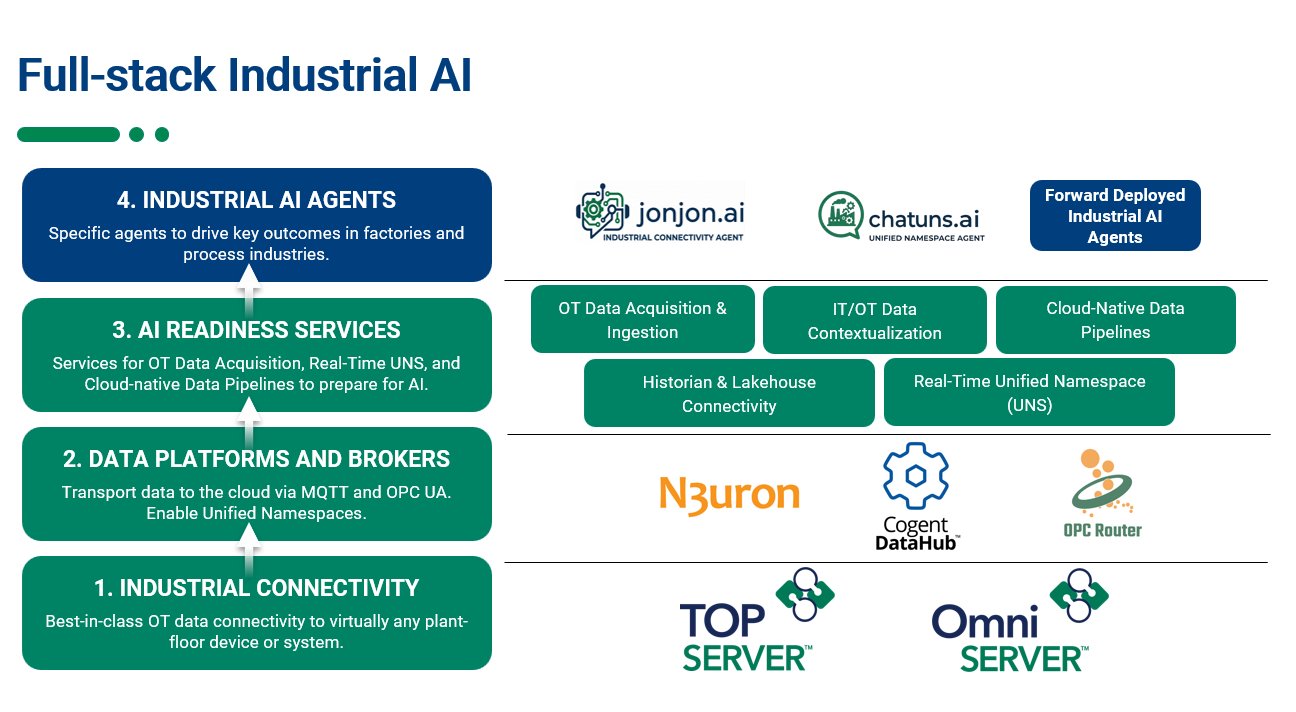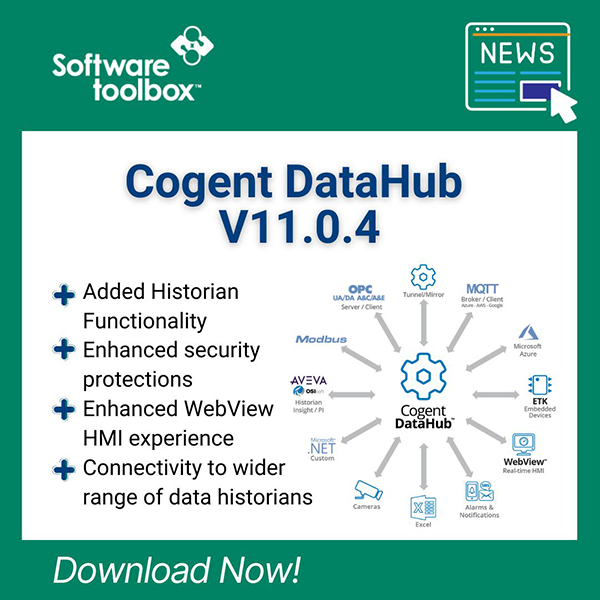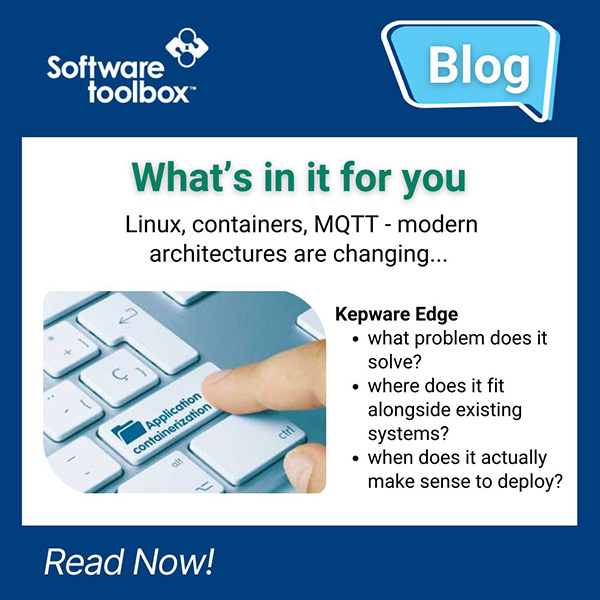Welcome to the kickoff post of our Data Storage Deep Dive blog series! In this series, we will explore the crucial role of data storage solutions and Historians in industrial automation. Over the coming weeks, we’ll be looking into how solutions delivered by Software Toolbox can be utilized with Historians, helping you make the most of your industrial data.

Historians vs. Databases: Understanding the Difference
Data is crucial to decision-making processes in the world of industrial automation, but not all data storage systems serve the same purposes. Two of the most widely used storage systems, historians and databases, may appear to be very similar at first glance. However, they are both important to users for different reasons.
Databases are general data storage systems that can manage a wide range of data for users such as transactional records. They are extremely adaptable, making them a popular choice for a wide range of applications across multiple industries. Despite this, databases sometimes struggle to keep up with the specialized needs of industrial automation, such as managing a large amount of high-frequency data.
Historians are often better suited for the industrial applications. They focus on storing and retrieving vast amounts of high resolution time-series data generated by sensors, control systems, and other industrial equipment. Historians are optimized for large-scale, high-speed data gathering, compression, storage, and retrieval, making them valuable for monitoring and analyzing the performance of processes over time. They also have advanced functions including retrieval methods that provide summarized, aggregated data upon “reading,” at impressive speeds. Most historians also have dedicated analysis and trending tools, allowing users to do basic to advanced analytics on historical data.
What to Expect from This Series
Throughout this series, our deep dive will uncover how our solutions help you connect to and make the most of Historians for your automation needs. We'll dive into practical use cases that illustrate the impact of Historians, showcasing real-world applications in optimizing processes, ensuring data integrity, and supporting compliance efforts across various industries.
The series will guide you through effective integration strategies, demonstrating how our solutions can simplify connections between Historians and other key systems like SCADA, PLCs, ERP platforms, and cloud services. You'll learn about some advanced functionalities our solutions offer and discover how to tailor these features to meet your unique operational needs.

Whether you're new to Historians or looking to enhance your current setup, this series aims to provide you with the insight and tools necessary for success. Follow along as we explore the powerful capabilities of data storage via Historians.
Why Historians Matter in Industrial Automation
In industrial environments, the ability to track and analyze historical data is crucial. Historians allow you to collect vast amounts of high resolution time-stamped data from various sources and store it efficiently. This data can then be used for real-time monitoring or long-term trend analysis, providing invaluable insights that drive better decision making.
Historians are particularly valuable for:
- Process Optimization: By analyzing historical data, you can identify patterns and trends that help you optimize processes, reduce waste, and improve efficiency.
- Data Integrity: Historians make sure that vital data is recorded and preserved without loss for consistent analysis and decision-making in sectors where data accuracy and dependability are of utmost importance.
- Regulatory Compliance: Many industries are required to maintain detailed records of their processes. Historians provide an efficient way to store and retrieve this data, ensuring you stay compliant with industry regulations.
- High-Speed Process Data: Storing and retrieving this data with a compression/decompression algorithm.
For industries dealing with high-speed data, such as oil and gas, manufacturing, life-sciences, pharmaceutical, or utilities, the efficiency of data retrieval is crucial. When an operator or engineer needs to analyze a particular event or trend, Historians can provide access to years' worth of data, allowing for quick and informed decision-making.
Traditionally historians are edge (on-site) based, but in recent years cloud and hybrid offerings have become popular in the industrial domain.
Solutions for Seamless Integration with your Historians
Connecting various systems to Historians can sometimes be challenging, but Software Toolbox offers a range of solutions to facilitate this process. These tools provide reliable data flow, supporting multiple standards and protocols like OPC UA, OPC DA, OPC HDA, MQTT, Sparkplug, and REST. Here's a quick breakdown of how some of our solutions at Software Toolbox can help integrate with Historians.
DataHub
- DataHub connects to various Process Historians, Cloud storage and Time-series databases such as AVEVA Historian, AVEVA PI, InfluxDB and historians supporting OPC HDA and OPC UA HDA.
- Can also serve as an OPC Classic HDA to OPC UA HDA gateway/bridge
- It supports secure tunneling to transfer data between systems and enables real-time data aggregation and store and forward capabilities, which solidifies data integrity even further.
- With support for OPC, database, and external Historian connectivity, DataHub simplifies the process of centralizing and managing historical data across different platforms.
- When using the External Historian configuration to write data to your Historian, users can also enable DataHub to read the written data back out of the Historian with just a few clicks.
If you would like to learn more about DataHub historian implementations, you can find that here. Also, be on the lookout for some upcoming posts in this series that will look deeper into DataHub’s capabilities.

OPC Router
OPC Router is often used to link to many different types of systems, such as databases, IoT/IIoT platforms, ERP systems, and historians. It allows for connecting to several storage options, including Oracle, InfluxDB, Microsoft SQL Server, and more. The visual data workflow configuration shown below delivers rapid time to value. You can turn your workflows into a template with a few clicks, and then mass configure workflows for differing data sets using those templates. Rapid results and configuration scalability result.
OPC Router can be a fantastic tool for gathering and storing data from multiple sources into historians because of its visual workflows, configuration scalability, REST support, and OPC support. Additionally, OPC Router's support for MQTT and Apache Kafka makes it well-suited for modern data ingestion needs, as MQTT is increasingly popular for feeding data into Historians, and Kafka enables high-throughput, low-latency data streaming across various industrial applications.
TOP Server
TOP Server provides seamless integration with many popular Historians, including AVEVA Historian, AVEVA PI, GE Proficy Historian, Canary Labs Data Historian, and more. This integration is predominantly achieved through OPC UA or OPC DA protocols. TOP Server supports OPC DA, OPC UA, and OPC HDA standards, allowing for both real-time data and historical data access. If you are looking to log data locally and make it available to other systems, the Local Historian Plug-in can enable Historical Data Access (HDA), ensuring data reliability even when network issues occur between TOP Server and your Historian.
Flow Software
Think of Flow as the information hub connecting your industrial information sources such as process historical data, business data, manually collected data and more to your data consumers. You can collect data simultaneously from multiple data sources, including historians, and this data is then indexed, aggregated, structured and contextualized in Flow and results stored in the Flow database, ready to be used for charts or dashboards among many other uses.
Dream Report
Dream Report is an advanced reporting and data analytics solution specifically designed for industrial automation. It connects seamlessly with OPC real time plus historical (OPC HDA) data sources and various Historians such as GE Proficy, DeltaV, Canary, Rockwell, AspenTech, and others. (Full list) Dream Report's flexibility in connectivity options makes it a powerful tool for transforming raw historical data into actionable insights, presented through customized reports and dashboards. These actionable insights tie directly into the process optimizations gained through pattern and trend identification mentioned before.
OPC Data Logger
If you need a way to store data, but do not need or use a full-blown Historian, and likely have budget constraints that impact that choice, OPC Data Logger may be the solution for you.
OPC Data Logger is a cost-effective solution for dynamic, event-driven data logging to text files and databases from OPC UA and DA real-time data sources. Triggered, conditional, and confirmed logging along with store & forward gets the data when you want it and ensures it ends up in the destination.
Our global users rely on the OPC Data Logger to store data in a standard SQL/ODBC database, including Microsoft SQL, Azure SQL, MySQL and others or text/CSV files.
Conclusion
The adaptability required to manage different industrial data storage and historian integration scenarios can be achieved through a variety of solutions delivered by Software Toolbox. These solutions enable companies to achieve historical data access across several applications and systems, while also enhancing their data collecting and storage capacities.
For more information on these products and their capabilities, you can explore Software Toolbox's product page and discover which solutions best suit your needs.
For more insights and updates on our solutions that enable connectivity to your Historians, and to follow along with the Data Storage Deep Dive series, subscribe to our blog. For additional information on our products discussed today, visit our product page. If you have any questions or need support, don't hesitate to contact our support team.






